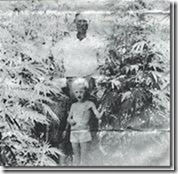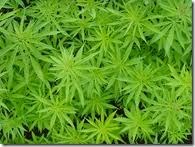BRUCE SCHREINER, Associated Press
Updated 2:24 p.m., Wednesday, November 14, 2012

FRANKFORT, Ky. (AP) — Kentucky Agriculture Commissioner James Comer says he will seek to legalize industrial hemp in 2013, and to kick off the effort he convened a Wednesday meeting of a hemp commission that hasn’t met in years.
A grassroots movement seeking to allow Kentucky farmers to grow industrial hemp gained new ground as the commissioner vowed passing hemp legislation would be his top priority. For now, however, federal law prohibits growing the plant for industrial, recreational or medicinal purposes because of its association with marijuana.
A farmer himself, Comer told members of the Kentucky Industrial Hemp Commission that the crop would flourish in the Bluegrass state and create manufacturing jobs if the federal government gives the go-ahead. He said hemp is a versatile crop that can be turned into paper, clothing, food, biofeuel, lotions and many other products.
"We can’t let our feet drag on this," Comer told reporters after Wednesday’s meeting. "We can’t let the General Assembly say, ‘Well we want to create a task force to study it.’ By that time … this will be another thing that the Kentucky General Assembly has loafed around on and let slip away."
He said that if federal authorities authorize industrial hemp cultivation, states would be in a "mad dash" to revive production — and Kentucky needs to be positioned for that possibility.
Comer, a Republican, presided over the first meeting of the hemp commission in a decade.
The board was created in 2001 to oversee industrial hemp research in Kentucky and make recommendations to the governor. Comer convened the 18-member panel to advocate for industrial hemp and work on marketing and education efforts.
Kentucky once was a leading producer of industrial hemp, a tall, leafy plant later outlawed for decades. Hemp and marijuana are the same species, cannabis sativa, but are genetically distinct. Hemp has a negligible content of THC, the psychoactive compound that gives marijuana users a high.
Those seeking to legalize the plant argue that it would create a new crop for farmers, replacing a hemp supply now imported from Canada and other countries. During World War II, the U.S. government encouraged farmers to grow hemp for the war effort because other industrial fibers were in short supply. But the crop hasn’t been grown in the U.S. since the 1950s when the federal government moved to classify hemp as a controlled substance related to marijuana.
Comer said he wants to see farmers planting industrial hemp in Kentucky by the spring of 2014, but only if the federal government approves.
"We will only do this in Kentucky if the United States Congress and the federal government give us permission," he said.
The hemp commission received $100,000 in seed money Wednesday to help pay for its advocacy for the plant.
Republican U.S. Sen. Rand Paul of Kentucky, co-sponsor of federal legislation to remove restrictions on hemp cultivation, is donating $50,000 from his political action committee to the commission. That donation is being matched by Dr. Bronner’s Magic Soaps, a natural soap manufacturer that uses hemp oil in its products.
David Bronner, chief executive of the California-based company, said the U.S. is the largest consumer market for hemp seed and fiber products, yet its farmers are prevented from growing the crop and sharing in the benefits.
"We’re continuing to hand the world’s largest market to Canadian farmers and Chinese farmers, and it’s ridiculous," he said after the hemp commission meeting.
The commission’s membership includes state lawmakers, hemp advocates and law enforcement representatives.
Maj. Anthony Terry, commander of the Kentucky State Police Special Enforcement Troop and a commission member, said after the meeting that law enforcement has reservations about legalizing hemp.
"We’re not supportive of it at this point," Terry said.
Terry raised concerns that people charged with marijuana possession or trafficking would claim they were caught with hemp instead of marijuana. That would force law enforcement to test every confiscated sample to determine if it was in fact marijuana, at great expense, he said.
Comer said the agriculture department wants to work with law enforcement.
"There’s nothing to hide," Comer said. "This crop has suffered from false stereotypes and misperceptions for years."
Other hemp commission members present included John Riley, a former magistrate in Spencer County; state Rep. Tom McKee, D-Cynthiana, chairman of the House Agriculture Committee; state Sen. John Schickel, R-Union; and M. Scott Smith, dean of the University of Kentucky College of Agriculture.
After the meeting, Comer went to the state Capitol pitch the legislation to a joint meeting of the House and Senate Agriculture committees.
Comer, a former state lawmaker, tried to assure his former colleagues that legalizing industrial hemp wouldn’t risk a voter backlash, saying misconceptins about hemp are "past us now."
"The people of Kentucky know the difference between industrial hemp and that other plant," he said.
Sen. David Givens, chairman of the Senate Agriculture Committee, said afterward that the Republican-led Senate is open-minded about the issue.
He said that Comer’s strong support for the hemp legislation will advance the legalization campaign. Givens, R-Greensburg, said hemp supporters are making headway in changing perceptions, but he has questions about establishing state regulatory oversight of a crop that may someday be legal.
"Do we need to create a bureaucracy for what would be a legal crop?" he said.
Read more: http://www.sfgate.com/news/crime/article/Comer-Legalizing-industrial-hemp-is-top-priority-4037089.php#ixzz2CEtcuzys







 Civilizations in Europe and Asia began harvesting hemp in 8,000 BCE to make textiles, paper, food, and medicine
Civilizations in Europe and Asia began harvesting hemp in 8,000 BCE to make textiles, paper, food, and medicine